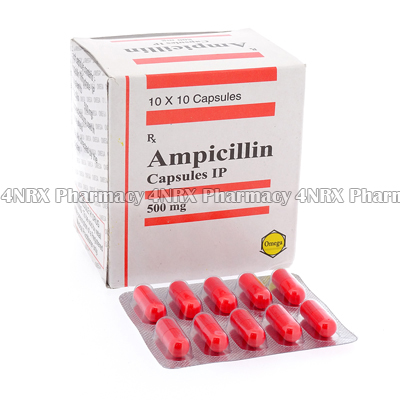 |
Home  Infection Infection  Ampicillin (Ampicillin) Ampicillin (Ampicillin) |
|
|||||||||
|
|
Ampicillin (Ampicillin)
What is Ampicillin (Ampicillin) used for? Ampicillin (Ampicillin) is an oral antibiotic used to treat a broad variety of bacterial infections. It works by preventing or slowing the reproduction of bacteria cells allowing the immune system to control or eliminate the infection. It is commonly prescribed for the treatment of pneumonia, bacterial meningitis, bronchitis, bacterial ear infections, bacterial throat infections, abdominal infections, bacterial endocarditis, or blood infections. Note that this medication is only for the treatment of bacterial infections and will not be useful against those caused by a virus or fungus. Your doctor may prescribe this medication to be used along with others or for the treatment of other unlisted conditions. How should I use Ampicillin (Ampicillin)? Ampicillin (Ampicillin) should be used strictly according to your doctor`s instructions to get the safest and most effective results from treatment. Most patients are prescribed up to four daily doses of one capsule for a cycle of medication lasting one or two weeks, but your individual directions will depend on your age, weight, current health, the condition being treated, and the severity of your symptoms. The capsules should be swallowed with a full glass of water and may be taken on an empty stomach, although a snack or meal is suggested before use if you experience nausea. Do not open the capsules or dissolve their contents before use as this may destroy or alter the effects. Ask your pharmacist or doctor any questions you have about the medicine to ensure the correct usage. What are the side effects of Ampicillin (Ampicillin)? Some patients using Ampicillin (Ampicillin) have reported experiencing side effects such as:
Serious or intense side effects that may require immediate medical attention are severe headaches, fever, flu symptoms, intense diarrhoea that is bloody or watery, urinary retention, anxiety, agitation, severe skin rashes, or seizures. Contact your doctor as soon as any intense or worrying symptoms appear to make sure the necessary changes are made to your application frequency or dosage to prevent more complications from occurring. Please Note Ampicillin (Ampicillin) should not be used to treat patients who are allergic to penicillin antibiotics or who have had a bad reaction to similar treatments in the past. Also inform your doctor if you have a history of allergies, suspected glandular fever, or decreased kidney function as these conditions may lead to unexpected complications during treatment. Strictly use Ampicillin (Ampicillin) as prescribed and follow all instructions provided by your doctor. Safe, suitable, and optimum dosage can vary and is dependent on the patient`s health and medical history, as well as the condition you are treating. Ampicillin (Ampicillin) may not be safe or suitable for all patients. Always ensure your doctor is informed if you are pregnant or breastfeeding, using any other type of medication (including non-prescription medicine, vitamins, and supplements), as well as if you have any allergies, other illnesses, or pre-existing medication conditions. Seek immediate medical attention or proceed to your nearest accident and emergency department if you suffer a hypersensitive or allergic reaction. Symptoms usually present during a reaction of this nature include difficulty breathing or swallowing, swelling of the limbs or face, tight chest, hives, and skin rashes. 
|
||||||||||||||||||